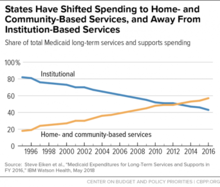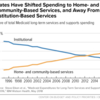0
Research
Community:
Mar 8, 2019
The number of kids enrolled in Medicaid and the Children’s Health Insurance Program (CHIP) — two government health plans for the poor — fell by nearly 600,000 in the first 11 months of 2018, a precipitous drop that has puzzled and alarmed many health policy analysts, while several states say it reflects the good news of an improving economy.
Authored by: Michael Ollove for The Pew Charitable Trusts
Topics: Affordable Care Act, Child welfare, Early childhood, Health, Legislation & Policy, Low-income, Medicaid / Medicare, Research, Youth
 Shared by Housing Is
Shared by Housing Is
Housing Is posted a
on Mar 8, 2019
Michael Ollove for The Pew Charitable Trusts
The number of kids enrolled in Medicaid and the Children’s Health Insurance Program (CHIP) — two government health plans for the poor — fell by nearly 600,000 in the first 11 months of 2018, a precipitous drop that has puzzled and alarmed many health policy analysts, while several states say it refl
0
Publication
Community:
Dec 17, 2018
In response to the heightened interest in the relationship between work and the health of individuals and communities, CMCS has clarified that Medicaid funds cannot be used to pay beneficiaries’ wages, but can pay for employment counseling as an optional benefit—to help people get jobs. Years of experience with work requirements for the Supplemental Nutrition Assistance Program, Aid to Families with Dependent Children, and populations with disabilities have developed the evidence for what is needed to help different populations find and keep jobs.
Authored by: Christopher F. Koller for Millbank Memorial Fund
Topics: Affordable Care Act, Disabilities, Health, Legislation & Policy, Low-income, Medicaid / Medicare, Research, Stability, Workforce development
 Shared by Mica O'Brien
Shared by Mica O'Brien
Mica O'Brien posted a
on Dec 17, 2018
Christopher F. Koller for Millbank Memorial Fund
In response to the heightened interest in the relationship between work and the health of individuals and communities, CMCS has clarified that Medicaid funds cannot be used to pay beneficiaries’ wages, but can pay for employment counseling as an optional benefit—to help people get jobs.
0
Publication
Community:
Dec 14, 2018
Health and reentry are closely related, and chronic medical, mental health, and substance use problems make it harder for newly released people to seek employment, obtain housing, and avoid reincarceration. Compared with the general population, justice-involved people tend to be in poorer health and need access to physical and behavioral health services, as well as the know-how and motivation to get care.
Authored by: Rochisa Shukla and Kamala Mallik-Kane for Urban Institute
Topics: Affordable Care Act, Criminal justice, Health, Legislation & Policy, Low-income, Medicaid / Medicare, Research, Stability
 Shared by Mica O'Brien
Shared by Mica O'Brien
Mica O'Brien posted a
on Dec 14, 2018
Rochisa Shukla and Kamala Mallik-Kane for Urban Institute
Health and reentry are closely related, and chronic medical, mental health, and substance use problems make it harder for newly released people to seek employment, obtain housing, and avoid reincarceration.
0
Case study
Community:
Dec 11, 2018
As the Trump Administration continues to encourage states to take Medicaid coverage away from people who don’t meet a work requirement, a new report describes Montana’s promising alternative: a workforce promotion program that targets state resources toward reducing barriers to work.
Authored by: Hannah Katch for Center on Budget and Policy Priorities
Topics: Affordable Care Act, Asset building, Health, Legislation & Policy, Low-income, Medicaid / Medicare, Partnerships, Research, Workforce development
 Shared by Housing Is
Shared by Housing Is
Housing Is posted a
on Dec 11, 2018
Hannah Katch for Center on Budget and Policy Priorities
As the Trump Administration continues to encourage states to take Medicaid coverage away from people who don’t meet a work requirement, a new report describes Montana’s promising alternative: a workforce promotion program that targets state resources toward reducing barriers to work.
0
Policy Brief
Community:
Dec 3, 2018
Some seniors and people with disabilities receiving home- and community-based services (HCBS) could lose their Medicaid eligibility and have to go into nursing homes to get needed care if Congress adjourns without extending “spousal impoverishment” protections that are set to expire on December 31.
Authored by: Judith Solomon for The Center on Budget and Policy Priorities
Topics: Affordable Care Act, Disabilities, Legislation & Policy, Medicaid / Medicare, Seniors
 Shared by Mica O'Brien
Shared by Mica O'Brien
Mica O'Brien posted a
on Dec 3, 2018
Judith Solomon for The Center on Budget and Policy Priorities
Some seniors and people with disabilities receiving home- and community-based services (HCBS) could lose their Medicaid eligibility and have to go into nursing homes to get needed care if Congress adjourns without extending “spousal impoverishment” protections that are set to expire on December 31.
0
Policy Brief
Community:
Nov 2, 2018
The new opioid legislation—the Substance Use-Disorder Prevention That Promotes Opioid Recovery and Treatment for Patients and Communities Act (the SUPPORT Act)—signed into law on October 24 includes targeted expansions in treatment, including provisions that provide funding or flexibility to states to expand access to treatment for substance use disorders (SUD), including opioid use disorder (OUD), and health care more generally in Medicaid and Medicare.
Authored by: Eva H. Allen and Lisa Clemans-Cope for The Urban Institute
Topics: Affordable Care Act, Health, Legislation & Policy, Low-income, Medicaid / Medicare, Safety, Substance abuse
 Shared by Mica O'Brien
Shared by Mica O'Brien
Mica O'Brien posted a
on Nov 5, 2018
Eva H. Allen and Lisa Clemans-Cope for The Urban Institute
The new opioid legislation—the Substance Use-Disorder Prevention That Promotes Opioid Recovery and Treatment for Patients and Communities Act (the SUPPORT Act)—signed into law on October 24 includes targeted expansions in treatment, including provisions that provide funding or flexibility to states
0
Report
Community:
Jul 23, 2018
The aim of the study was to understand how policy capacity was defined and managed by state health leaders in different political environments during the implementation of the ACA. We conducted a total of 24 interviews, 18 with state executive agency officials and six with legislators from 10 states. The the final sample includes two states from the Northeast, three from the South, three from the Midwest, and two from the West.
Authored by:
Topics: Affordable Care Act, Funding, Health, Legislation & Policy, Low-income, Medicaid / Medicare, Partnerships
 Shared by Housing Is
Shared by Housing Is
Housing Is posted a
on Jul 23, 2018
The aim of the study was to understand how policy capacity was defined and managed by state health leaders in different political environments during the implementation of the ACA.
0
Report
Community:
Jul 23, 2018
The aim of the study was to understand how policy capacity was defined and managed by state health leaders in different political environments during the implementation of the ACA. Working with a sample of states—large and small, red and blue, actively reformist or more circumspect, etc.—the research team interviewed 18 state executive agency officials and six legislators from 10 states about their experiences developing and sustaining the capacity needed for major transformations in health care
Authored by:
Topics: Affordable Care Act, Funding, Health, Legislation & Policy, Low-income, Medicaid / Medicare, Partnerships, Research
 Shared by Housing Is
Shared by Housing Is
Housing Is posted a
on Jul 23, 2018
The aim of the study was to understand how policy capacity was defined and managed by state health leaders in different political environments during the implementation of the ACA.
0
Policy Brief
Community:
Jul 20, 2018
This report examines several ways in which health care changes created by the ACA, and other health care reform initiatives, create the potential for affordable housing providers to collaborate with health care providers, insurers, and other institutions to support the wellbeing of low-income individuals and families.
Authored by:
Topics: Affordable Care Act, Health, Homelessness, Housing, Legislation & Policy, Low-income, Medicaid / Medicare, Partnerships
 Shared by Housing Is
Shared by Housing Is
Housing Is posted a
on Jul 20, 2018
This report examines several ways in which health care changes created by the ACA, and other health care reform initiatives, create the potential for affordable housing providers to collaborate with health care providers, insurers, and other institutions to support the wellbeing of low-income indiv
0
Research
Community:
Jul 19, 2018
The link between federal housing policy and public health has been understood since the nineteenth century, when housing activists first sought to abolish slums and create healthful environments. This article describes how the Obama administration—building on these efforts and those that followed, including the Great Society programs of President Lyndon Johnson—has adopted a cross-sector approach that takes health considerations into account when formulating housing and community development policy. The federal Department of Housing and Urban Development fully embraces this “health in all policies” approach. Nonetheless, the administration’s strategy faces challenges, including fiscal and political ones. Some of these challenges may be overcome by conducting quality research on how housing and community development policies affect health outcomes, and by developing a federal budget strategy that takes into account how investments in one sector contribute to cost savings in another.
Authored by:
Topics: Affordable Care Act, Community development, Disabilities, Health, Healthy homes, Housing, Legislation & Policy, Low-income, Mobility, Partnerships, Place-based, RAD, Research
 Shared by Housing Is
Shared by Housing Is
Housing Is posted a
on Jul 19, 2018
The link between federal housing policy and public health has been understood since the nineteenth century, when housing activists first sought to abolish slums and create healthful environments.
0
Policy Brief
Community:
Jul 17, 2018
Medicaid is the nation’s public health insurance program for people with low income. The Medicaid program covers more than 70 million Americans, or 1 in 5, including many with complex and costly needs for care. The vast majority of Medicaid enrollees lack access to other affordable health insurance. Medicaid covers a broad array of health services and limits enrollee out-of-pocket costs. The program is also the principal source of long-term care coverage for Americans. As the nation’s single largest insurer, Medicaid provides significant financing for hospitals, community health centers, physicians, and nursing homes, and jobs in the health care sector. The Medicaid program finances over 16% of all personal health care spending in the U.S.
Authored by:
Topics: Affordable Care Act, Funding, Health, Legislation & Policy, Low-income, Medicaid / Medicare
 Shared by Housing Is
Shared by Housing Is
Housing Is posted a
on Jul 17, 2018
Medicaid is the nation’s public health insurance program for people with low income. The Medicaid program covers more than 70 million Americans, or 1 in 5, including many with complex and costly needs for care.
0
Policy Brief
Community:
Jul 13, 2018
A Toolkit for State Agencies
Authored by:
Topics: Affordable Care Act, Health, Legislation & Policy, Low-income, Medicaid / Medicare
 Shared by Housing Is
Shared by Housing Is
Housing Is posted a
on Jul 13, 2018
A Toolkit for State Agencies
0
Report
Community:
Jul 12, 2018
Considerations for Mental Health and Substance Use Providers
Authored by:
Topics: Affordable Care Act, Health, Healthy homes, Legislation & Policy, Low-income, Medicaid / Medicare, Partnerships
 Shared by Housing Is
Shared by Housing Is
Housing Is posted a
on Jul 12, 2018
Considerations for Mental Health and Substance Use Providers
0
Policy Brief
Community:
Jul 10, 2018
This brief provides an overview of current federal standards and state options in Medicaid to help inform upcoming debates about increasing state flexibility in the program as part of efforts to restructure Medicaid financing.
Authored by:
Topics: Affordable Care Act, Cost effectiveness, Funding, Health, Legislation & Policy, Low-income, Medicaid / Medicare
 Shared by Housing Is
Shared by Housing Is
Housing Is posted a
on Jul 10, 2018
This brief provides an overview of current federal standards and state options in Medicaid to help inform upcoming debates about increasing state flexibility in the program as part of efforts to restructure Medicaid financing.
2
News Article
Community:
Mar 2, 2017
Dr. Ben Carson becomes HUD Secretary with 58 to 41 vote in the Senate
Authored by:
Topics: Affordable Care Act, Funding, Health, Housing, Legislation & Policy
 Shared by Steve Lucas
Shared by Steve Lucas
Steve Lucas posted a
on Mar 2, 2017
On March 2, 2017 the U.S. Senate confirmed the nomination of Dr. Benjamin S. Carson, Sr. as the 17th Secretary of the U.S. Department of Housing and Urban Development by a 58 to 41 vote. Dr. Carson’s confirmation followed a relatively non-controversial nomination hearing in January and a straight-forward procedural vote in late February that advanced his nomination to the Senate floor.
Dr. Ben Carson becomes HUD Secretary with 58 to 41 vote in the Senate


 Shared by Housing Is
on Mar 8, 2019
Shared by Housing Is
on Mar 8, 2019

 Shared by Housing Is
on Dec 11, 2018
Shared by Housing Is
on Dec 11, 2018


 Shared by Housing Is
on Jul 23, 2018
Shared by Housing Is
on Jul 23, 2018
 Shared by Housing Is
on Jul 23, 2018
Shared by Housing Is
on Jul 23, 2018
 Shared by Housing Is
on Jul 20, 2018
Shared by Housing Is
on Jul 20, 2018
 Shared by Housing Is
on Jul 19, 2018
Shared by Housing Is
on Jul 19, 2018
 Shared by Housing Is
on Jul 17, 2018
Shared by Housing Is
on Jul 17, 2018
 Shared by Housing Is
on Jul 13, 2018
Shared by Housing Is
on Jul 13, 2018
 Shared by Housing Is
on Jul 12, 2018
Shared by Housing Is
on Jul 12, 2018
 Shared by Housing Is
on Jul 10, 2018
Shared by Housing Is
on Jul 10, 2018

 Shared by Steve Lucas
on Mar 2, 2017
Shared by Steve Lucas
on Mar 2, 2017
